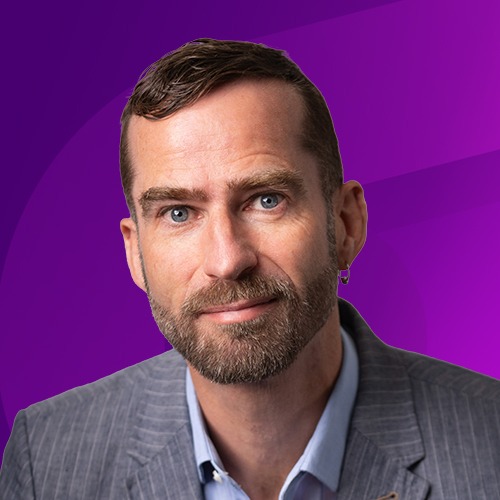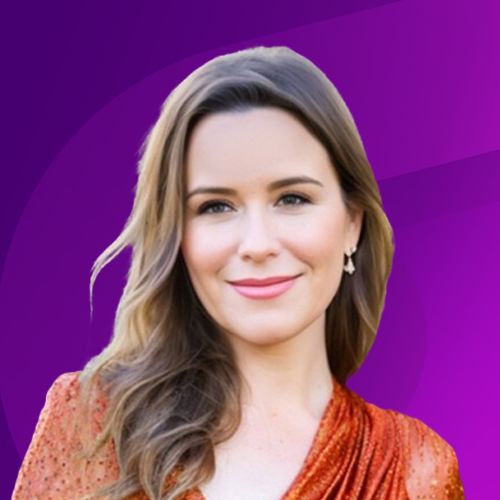In an operating climate that is constantly changing, companies are recognising the importance of adaptability more than ever before. To highlight the efforts of influential leaders who have helped promote resilience and flexibility in their organisations, clients, and communities, iluminr has created The Gamechangers in Resilience interview series, featuring voices from around the world. Through their efforts, these leaders have enabled their organisations, teams, ecosystems, and communities to thrive even in challenging times.
Milena Maneva is the co-founder and managing partner at the Resilience Think Tank and has over 15+ years of diverse experience across financial services, brokerage, law, and real estate industries. With expertise in resilience, risk management, governance, business continuity, and crisis management, she is passionate about enabling organisations and individuals to reach their full potential by fostering a culture of preparedness and resilience. Milena holds an MSc in Risk Management and serves as a Board Director at The BCI, driving the advancement of business continuity and resilience practices.
Q: How did you end up in Resilience?
Milena: My journey to the resilience profession was intentional and driven by a deep passion for risk, resilience, and governance. Unlike many of my peers who stumbled into the field as an extra job task, I actively chose to specialise in this area. As I worked in the industry and honed my skills, I became increasingly fascinated with the human aspect of resilience, which involves developing the mindset and skills necessary to recover from unexpected events.
This passion led me to co-found the Resilience Think Tank, where along with other co-founders we could help organisations, communities and individuals build resilience, prepare for the unexpected and shape the future of resilience. Additionally, my experience and expertise in the field led me to be named as a Board Director at the Business Continuity Institute (BCI). Through this position, I have the opportunity to help shape the future of resilience and further advance this critical field.
My journey to the resilience profession is unique in that it was a conscious decision driven by my passion and expertise. I am excited to continue pushing the boundaries of resilience and helping others to develop the skills and mindset necessary to thrive in an unpredictable world.

Q: What is the leadership playbook you are writing for yourself in real-time?
Milena: My leadership playbook is centered around three core principles: adaptability, empathy, and integrity. In times of uncertainty and change, leaders must be able to adapt to new situations quickly and effectively.
This means being open-minded, flexible, and willing to pivot when necessary. At the same time, leaders must be empathetic and compassionate, recognising the human impact of the decisions they make and taking the time to understand the perspectives and needs of others. Finally, leaders must operate with integrity and transparency, always doing what is right for their team and their organisation.
To live these principles in real-time, I prioritise regular check-ins with my team to ensure that we are aligned and that everyone feels supported. I also seek out opportunities to learn from other leaders, whether through mentorship or peer networks. Finally, I am committed to modelling the behaviour I want to see in others, which means being authentic, accountable, and resilient in the face of challenges.

Q: Much of your career tenure has been leading Resilience in financial services. How has the industry changed over that time?
Milena: Over the past 15+ years, the financial services industry has undergone a transformative shift in mindset towards resilience. What used to be seen as a mere regulatory requirement is now recognised as a strategic imperative that can protect people, reputation, and the bottom line. This shift has been driven by a growing realisation that organisations need to be able to withstand unexpected events and to recover quickly when they do occur. It has also been fueled by an increasing recognition of the importance of risk culture and employee engagement in building resilience.
The COVID-19 pandemic, political unrest, and ongoing conflicts around the world have further accelerated this shift towards a more proactive approach to resilience. Organisations have had to adapt quickly to new challenges, such as remote work and supply chain disruptions, and to mitigate new risks, such as cyber threats and disinformation campaigns. This has led to increased investment in resilience programmes and a greater focus on scenario planning and stress testing.
At the same time, individuals are recognising the importance of building resilience in their personal and professional lives in the face of ongoing uncertainty and unpredictability. They are learning to develop the mindset and skills necessary to recover from unexpected events, and to view resilience as a crucial aspect of their personal and professional growth. This has led to a greater awareness of the benefits of resilience and a growing demand for resources and support to help individuals and organisations build resilience.
Overall, the financial services industry has made great strides in building resilience, recognising that it is not just a regulatory requirement, but a strategic imperative that can protect their people, reputation, and bottom line. By embracing a proactive and forward-thinking approach to resilience, organisations and individuals alike can thrive in an unpredictable world.
Q: You have just been named to the BCI Board. Congratulations! Tell me more about your experiences with BCI, some of the exciting initiatives you have planned, and what your vision is for the organisation.
Milena: Thank you! I am honoured and excited to join the BCI Board. I have had the privilege of being a member of the BCI community for many years, serving on various committees and advisory boards and witnessing first-hand the passion and dedication of its members. My experience has reinforced my belief that the BCI is a vital organisation that plays a critical role in advancing the field of resilience.
My vision for the organisation is to continue to build on its strengths, including its global reach and its commitment to professional development and thought leadership. I believe that the BCI has a critical role to play in helping organisations and individuals become more resilient, and I am eager to contribute to that mission. In terms of initiatives, I am particularly interested in advancing diversity, equity, and inclusion in the resilience profession, as well as in exploring new ways to leverage technology and data to enhance resilience.
As a member of the BCI Board, I am committed to advancing the organisation’s mission of promoting excellence in the resilience profession and helping individuals and organisations become more resilient. I look forward to working with my fellow Board members and the wider BCI community to achieve these goals and drive positive change in the field of resilience.

Q: Back in 2021, you co-founded the Resilience Think Tank, providing independent guidance and research to the risk and resilience industry. What inspired this mission?
Milena: The Resilience Think Tank (RTT) was founded with a clear mission to provide independent and objective guidance on resilience. With years of experience in the industry, we have seen first-hand the challenges that organisations and professionals face in navigating the complex and overwhelming landscape of resilience products and services. Specifically, there is a gap in the market for unbiased and independent guidance that provides practical, actionable advice.
Our ultimate goal is to promote and enhance resilience for a more secure and sustainable future. To achieve this, the RTT is dedicated to providing guidance that enables organisations and individuals to thrive in the face of uncertainty. RTT is committed to promoting the importance of resilience, leadership, and diversity. We have undertaken initiatives to help organisations and their leaders build a culture of preparedness, including workshops, training programmes, and public speaking events. Through these activities, we aim to foster greater understanding of the importance of resilience in today’s rapidly changing world.
Q: You are a tremendous champion of the advancement of women, including giving women practical strategies to advocate for themselves. What has this experience been like for you?
Milena: Advocating for the advancement of women is a deeply personal and professional mission for me. Having worked in male-dominated industries such as financial services, brokerage, and resilience, I have witnessed the challenges women face first-hand.
I believe that it is essential to support and mentor women at all stages of their careers, and to provide them with the necessary tools and strategies they need to succeed. This work has been incredibly rewarding and inspiring, both in terms of the impact that I have been able to have on women and in terms of the broader cultural change that I see happening in the industry. I am committed to building allies, educating colleagues, and striving for equality as we continue to work towards a more inclusive future.

Q: What advice would you have for women who are earlier in their career journey?
Milena: For women who are at the beginning of their career journey, my advice would be to focus on building their confidence and resilience. It’s important to proactively seek out opportunities to showcase your skills and abilities and don’t shy away from sharing your ideas. Remember that setbacks and challenges are a natural part of any journey, so don’t let them discourage you. Find mentors, sponsors or networks who can provide guidance and support and be open to learning from them.
Taking risks and trying new things is also crucial for growth and development, so don’t be afraid to step outside your comfort zone. Finally, remember that success is not always linear, and it’s okay to pivot and change course as you learn and grow.
Q: Why is DEI important when building resilience?
Milena: In today’s rapidly changing business landscape, building resilience is essential for organisations to survive and thrive. But what role does diversity, equity, and inclusion play in this process? Diversity, Equity, and Inclusion (DEI) are essential in building resilience because they ensure that organisations can effectively manage a range of risks.
In a diverse and inclusive environment, organisations can better understand and address the needs and perspectives of all stakeholders, including employees, customers, and communities.
This helps mitigate reputational, legal, and operational risks while strengthening overall resilience. Moreover, DEI helps build trust and foster collaboration, key components of effective crisis management. By promoting DEI, organisations create a more resilient culture that can adapt to changing circumstances and thrive in times of uncertainty.
Q: What guidance do you give teams looking to be more diverse and inclusive in their Resilience efforts?
Milena: When it comes to building diverse and inclusive resilience efforts, there are a few key pieces of guidance that I provide to teams. First, it’s important to recognize that diversity and inclusion are not just checkboxes to be ticked, but rather ongoing processes that require ongoing effort and attention. To that end, teams should start by examining their current processes and identifying any potential biases. This includes examining job descriptions and hiring processes to ensure they are inclusive, as well as creating an open and transparent workplace culture that encourages diverse perspectives and voices. Additionally, building relationships with diverse organisations and communities can foster a sense of inclusivity and help to gain new perspectives and insights.
To truly build diverse and inclusive resilience efforts, it’s important to prioritise authenticity and genuine investment in DEI initiatives, rather than simply going through the motions for the sake of appearances or to appease external stakeholders.
Instead of viewing DEI as a “checkbox” to be ticked off, it should be integrated into the core values and practices of the organisation. This means recognising that diversity and inclusion are ongoing processes that require ongoing effort and attention, and taking concrete steps to ensure that DEI is a priority in all aspects of the organisation’s operations.
By investing in DEI initiatives in a meaningful way, organisations can build a strong foundation for long-term success and resilience. Finally, it’s important to regularly assess and evaluate the effectiveness of these efforts, and to make adjustments as needed to ensure that diversity and inclusion remain a priority in all resilience-related initiatives.

Q: What is the leadership playbook you are writing for yourself in real-time?
Milena: As a leader dedicated to promoting resilience, I am constantly updating and enhancing my unique leadership guidebook. My guidebook revolves around agility and adaptability, especially during times of crisis. To foster a resilient mindset and culture within organisations, I prioritise building and sustaining strong relationships, proactively identifying risks and opportunities, and promoting inclusivity and diversity within teams. I believe that continuous learning and personal growth are essential to effective leadership, and I am committed to staying up to date with the latest industry trends and seeking feedback and advice from my peers.
My leadership playbook is also founded on the principles of communication, transparency, and accountability. I understand that effective communication is essential to achieving our shared goals, and I prioritise open and honest dialogue with my team members. Transparency is also critical, and I believe that leaders should be transparent in their decision-making processes, goals, and objectives. Finally, accountability is essential to ensuring that our goals are accomplished efficiently and effectively, and I hold myself and my team members accountable for our actions and decisions.
Overall, my leadership guidebook reflects my commitment to promoting resilience, fostering inclusivity and diversity, and prioritising communication, transparency, and accountability in all of my leadership efforts.
Q: What is the hardest part about leadership in crisis?
Milena: Leading during a crisis is a daunting task, as it involves making critical decisions with limited information while prioritising the safety and well-being of everyone involved. It’s a high-pressure situation that can be emotionally and mentally taxing, and it demands a great deal of resilience from leaders to navigate the uncertainty and turbulence of the crisis. Furthermore, leaders must demonstrate empathy and compassion towards those affected by the crisis while maintaining a clear focus on the organisation’s objectives and goals. Balancing these priorities and expectations requires exceptional leadership skills, effective communication, and a willingness to adapt and pivot as needed. Ultimately, the most challenging aspect of leadership in a crisis is managing the complex and competing demands on leaders’ time, energy, and attention while remaining grounded and focused on what matters most.

Q: How do you apply the lessons of Resilience in your everyday life?
Milena: I apply the lessons of resilience in my everyday life by adopting a growth mindset and embracing challenges as opportunities for growth and learning. I recognise that life is a continuous learning experience, and that setbacks and failures can provide valuable opportunities for personal development. In addition to prioritising self-care and emotional regulation, I also seek out diverse perspectives and experiences, which helps me to build my own resilience and expand my understanding of the world. By staying grounded in the present moment and focusing on what’s truly important, I’m better able to manage stress and overcome obstacles. Finally, I practice gratitude and focus on the positive aspects of my life, which helps me to maintain a sense of perspective, cultivate optimism, and stay motivated in the face of adversity.














